☆ PuniPuni Youtube ☆
How to Express Excessiveness in Japanese Using「すぎる」- Review Notes
Today we learned how to express excessiveness in Japanese using すぎる (sugiru).
In these video review notes we will go over today’s Japanese grammar in greater detail and see some more examples!
………………………………………………………………………………..
Express excessiveness using 〜すぎる:

★ Today we will learn how to express excessiveness in Japanese using 〜すぎる (sugiru).
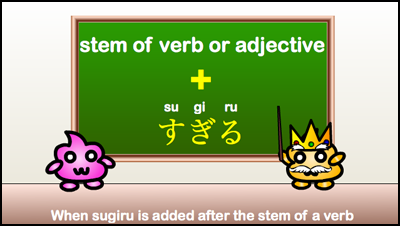
★ すぎる (sugiru) can be added to the stem of a verb or adjective.
★ verb stem + すぎる (sugiru) = “____ too much.”
★ adjective stem + すぎる (sugiru) = “too ____.”
………………………………………………………………………………..
Review: How to find the verb stem
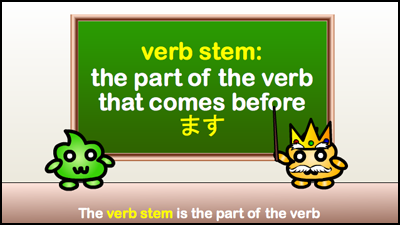
★ The verb stem is the part of the verb that comes before ます (masu) in the masu-form of the verb.
★ For example: the stem of the verb 見ます (mimasu) is 見 (mi).
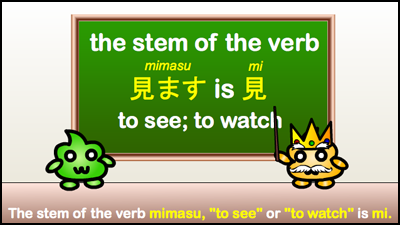
………………………………………………………………………………..
Review: How to find the adjective stem
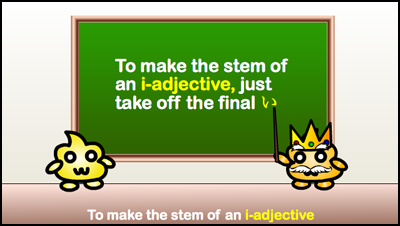
★ If you don’t know how to find the stem of an adjective, here’s how:
1. For い – adjectives (i-adjectives) like おいしい (oishii), take off the final い (i)
おいしい (oishii) ➡ おいし (oishi)
2. For な – adjectives (na-adjectives) like 元気な (genki na), take off the final な (na)
元気な (genki na) ➡ 元気 (genki)
………………………………………………………………………………..
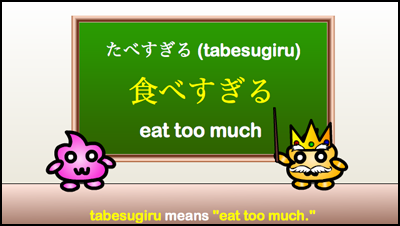
★ Once you have found the stem of the verb or adjective, just add すぎる (sugiru) to the end.
★ For example, the stem of the verb 食べます (tabemasu) is 食べ (tabe). Add すぎる (sugiru) and it becomes 食べすぎる (tabesugiru) – eat too much.
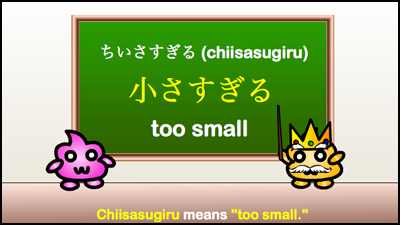
★ The stem of the i-adjective 小さい (chiisai) is 小さ (chiisa). Add すぎる (sugiru) and it becomes 小さすぎる (chiisasugiru) – too small.
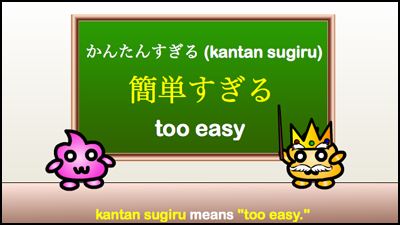
★ The stem of the na-adjective 簡単な (kantan na) is 簡単 (kantan). Add すぎる (sugiru) and it becomes 簡単すぎる (kantan sugiru) – too easy.
………………………………………………………………………………..
Sugiru is a ru-verb and is conjugated:
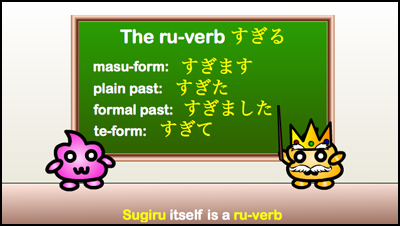
★ すぎる (sugiru) itself is a る-verb (ru-verb) and is conjugated as one.
Masu-form (polite present tense):
すぎます (sugimasu)
Plain past tense (ta-form):
すぎた (sugita)
Formal past (polite past tense):
すぎました (sugimashita)
Te-form:
すぎて (sugite)
………………………………………………………………………………..
Example 1:
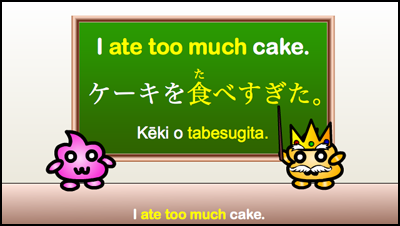
★ In this sentence, the verb is in plain past tense: 食べすぎた (tabesugita) – ate too much.
………………………………………………………………………………..
Example 2:
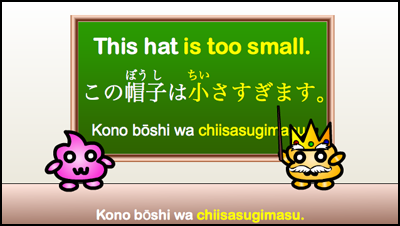
★ In this sentence, the verb is in polite present tense: 小さすぎます (chiisasugimasu) – too small.
………………………………………………………………………………..
Example 3:
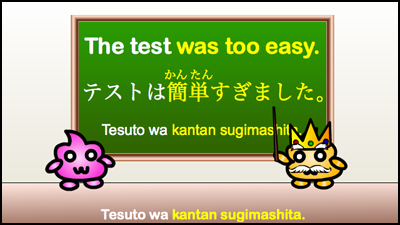
★ In this sentence, the verb is in polite past tense: 簡単すぎました (kantan sugimashita) – was too easy.
………………………………………………………………………………..
Extra Examples with Verbs
Number 1:
ビールを飲みすぎました。
Bīru o nomisugimashita.
I drank too much beer.
………………………………………………………………………………..
Number 2:
寝すぎた。
Nesugita.
I slept too much.
………………………………………………………………………………..
Number 3:
弟はいつもテレビを見すぎます。
Otōto wa itsumo terebi o misugimasu.
My little brother always watches too much TV.
………………………………………………………………………………..
Extra Examples with Adjectives
Number 1:
このパソコンは古すぎる。
Kono pasokon wa furusugiru.
This computer is too old.
……………………………………………………………………………….
Number 2:
この靴は大きすぎます。
Kono kutsu wa ookisugimasu.
These shoes are too big.
……………………………………………………………………………….
Number 3:
私の犬は元気すぎる。
Watashi no inu wa genki sugiru.
My dog is too energetic.
……………………………………………………………………………….
Conclusion:
Today we learned how to use 〜すぎる (sugiru) to express excessiveness in Japanese.
……………………………………………………………………………….
Do you want a Japanese tutor?
Take Japanese Skype Lessons with Professional Japanese Teachers on kakehashijapan.com!
………………………………………………………………………………..
………………………………………………………………………………..









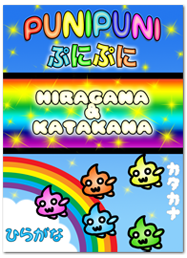
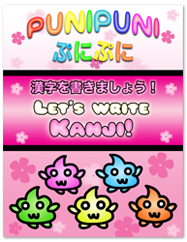


9 comments
I noticed you talked about -ru verbs in the video. Will you be going over verbs types in a future grammar lesson? That would be quite helpful!
Comment by Chip on 11/15/2013 at 11:00 pmYes! We will be making a video on verb types shortly! \(◕ω◕)/☆
Comment by PuniPuni on 11/18/2013 at 12:17 amHow would you say “too cute”? Kawaisugiru? o.O
Comment by Crystal on 11/18/2013 at 12:41 amYes! “Too cute” is かわいすぎる – kawaisugiru (◕ω<)♥
Comment by PuniPuni on 11/20/2013 at 6:10 amIs it sometimes understood as a good thing in Japanese when someone says something is “too good”, as in English?
aka “You’re too cute!” is positive in English sometimes.
Love the website :3
Comment by Lexi M on 07/08/2014 at 12:11 pmYes, you can say that! Thanks (◕ω<)♪
Comment by PuniPuni on 07/13/2014 at 9:32 amDoes adding just すぎる make the sentence into the plain/casual present tense?
Comment by Dane on 07/28/2014 at 12:15 pmすぎる is the plain present form of the verb, but I can’t say that you could add it to every sentence, as it does have a meaning. If you have any specific examples you would like to check, let me know.
Comment by PuniPuni on 08/01/2014 at 7:50 amどうもありがとう!
Comment by Mário on 06/08/2018 at 4:59 am